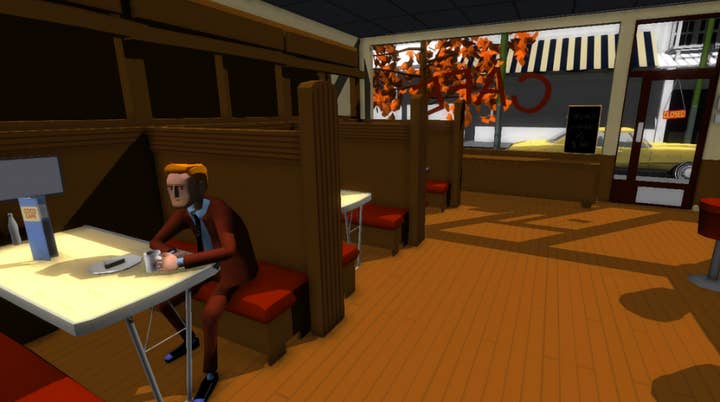Variable State: "Indie is the real cutting edge of games"
Jonathan Burroughs and Terry Kenny introduce their new studio
It's not unusual for GamesIndustry International to talk to a brand new indie studio, but it is surprisingly rare to talk to one that's focused on creating a story-led title, funding itself and resisting the temptation to go free-to-play. Jonathan Burroughs and Terry Kenny are Variable State, and they're eschewing the usual start-up cliches in favour of creativity and culture.
"Indie is the real cutting edge of games. It's not about the technical frontier any more, it's not like better lighting or better AI or transitioning from 2D to 3D or any of that," says Burroughs.
"The tools are there now to go and make incredible experiences, and that's what indie is doing and what mainstream is perhaps not able to do because of the commercial inertia that it's caught up in."
Burroughs worked as a writer and designer on House of the Dead: Overkill, Battalion Wars 2 and Battlefield 2: Modern Combat to name a few, while Kenny is an animator and artist with House of the Dead: Overkill and Grand Theft Auto: San Andreas to his credit. The two joined forces after their last employer, DeepMind Technologies, was acquired by Google and they found themselves at a loose end. Their shared love of story-based games like Kentucky Route Zero, and their love of the indie culture, were key to forging a new working relationship.
"Indie developers have shown just how far you can stretch the definition of what a video game is"
"Indie developers have shown just how far you can stretch the definition of what a video game is," says Kenny.
"They often embrace practices that larger studios avoid or have abandoned, and are prepared to work in styles and themes that a AAA studio would never go near. So I guess they have the freedom and the courage to experiment and, by doing so, innovate a bit more often. I also think there is a lot to be said for having an open development process and engaging with people who might be interested in what you're doing from the beginning."
The pair are currently working on their first project, which will be a "reflection of our personal tastes and interests." Burroughs mentions Gone Home and talks about games where you can see the intent and the craft of the developers, where, "you can see the brushstrokes, like it's the rough edges that had not been polished away to a fine sheen like you'd get in a AAA game."
Kenny says so far the journey for Variable State, and making their development dreams a reality, has been both liberating and stressful.
"The liberating part makes the stress a lot easier though, and the stress of working on a personal project is different to the kind of frustration I've felt on bigger titles. It's easier to address the project related problems that are stressing me out because we are a small team and we can decide to just go ahead and fix or change something."
Burroughs is enthusiastic about being part of the indie scene, about being part of a scene that's collaborative and open and interested in pushing boundaries. You get the sense that he can really embrace that now, in a way that wasn't always possible at other studios.
"You can be completely switched on to what's going on in the culture around you - in other media or just in the news and in society - and bring that into your personal experiences. The things that affected you in your life up until that point you can bring into your game, and that can be reflected in the game in a meaningful way and then can go out and influence the culture," he explains.

"It scares me a little bit thinking too much about the commercial implications of it and worrying how that might taint the actual substance of the game in some way, which is a slightly naïve way to think about things because I know I've got to pay my bills at some point."
Of course it's not all roses and cupcakes in indie land, and Burroughs is well aware of that. He expresses his concerns that Steam might start to see the same avalanche of titles as the mobile market, one that hides all but a few lucky games. He worries that will make marketing more and more important, and could even affect the type of games that get made.
"I don't want to be worrying about marketing and making the game commercial"
"Games like Goat Sim and all the sim genre of games that has emerged, you can see it exists because it creates viral marketing opportunities and creates headlines," he says.
"I wonder if we are going to see more of that in games tailored to attracting an audience in the indie space. And that worries me and upsets me slightly because I feel like indie to some extent is set apart from the mainstream, partly because it's trying to avoid those commercial imperatives - it's trying to avoid being poisoned by money. I don't want to be worrying about marketing and making the game commercial. I'd much rather tell a great story."
For now the team is using its savings to fund its first project, but Burroughs is adamant that even if the money runs out the enthusiasm for Variable State won't.
"We figured out that we both probably have about a year where we can just stay at home and work on this full-time until we probably have to start panicking and looking for a job, or looking for another source of income or backing of some sort to help the game carry on," he explains.
"We are both very much in agreement, though, that even if we got to that point we are not finished with the game. We would carry on with the game, no matter what."









